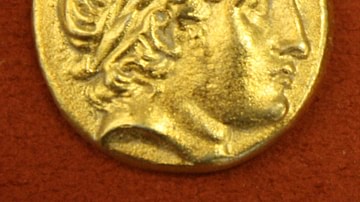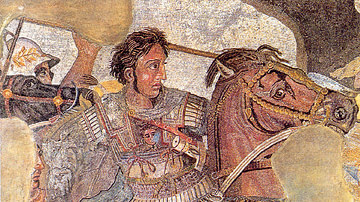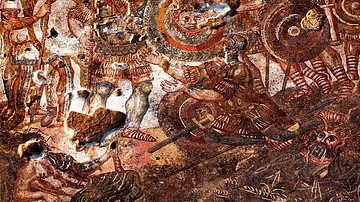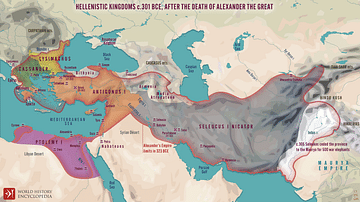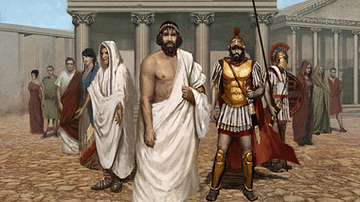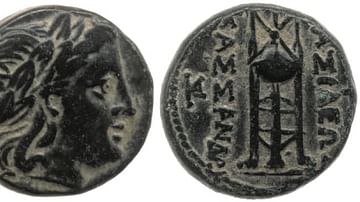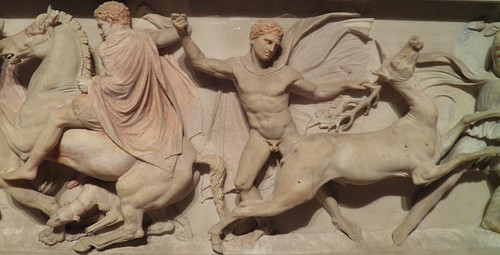
Hephaestion was a member of Alexander the Great's personal bodyguard and the Macedonian king's closest and lifelong friend and advisor. So much so, Hephaestion's death would bring the young king to tears. From 334 to 323 BCE Alexander the Great conquered much of the known world. He led his army on a ten-year odyssey across Asia Minor and into Persia, Egypt and India. Eventually, after his defeat of Darius III, he became the self-proclaimed King of Asia. Of course, he could not have done this without the support of his loyal army and staff of skilled officers – Ptolemy I, Perdiccas, and Craterus, but above all others, Hephaestion.
Early Life
The son of Amyntas, Hephaestion was raised in the Macedonian capital of Pella and according to most sources born in 356 BCE, the same year as the king. Being from an aristocratic family, as were many of the staff officers who would follow Alexander into Asia, he became a student, alongside Alexander, of the philosopher Aristotle at Mieza, a city west of Pella. His intelligence impressed the Athenian academic, and, like the king, they would correspond with each other during the long Persian campaign.
Hephaestion was considered handsome by many, and Alexander's father, Philip II of Macedon, regarded him as an excellent influence on his son. Shortly after Philip married Cleopatra, the future king became concerned about his position as successor. A disagreement erupted between Philip and Alexander, a dispute fueled by his friends. Because of this, many of Alexander's friends were sent into exile; however, because of Philip's respect for Hephaestion, he was spared this humiliation.
On Campaign
In 334 BCE, after regaining the loyalties of many of the Greek city-states – especially following the razing of Thebes – Alexander and his army crossed the Hellespont on the first leg of their conquest of Persia. However, before clashing with the Persian army at River Granicus, Alexander chose to visit the tomb of his hero (and supposed ancestor) Achilles at Troy (a small village at the time of Alexander). Such was his fascination with the hero, the king always slept with a copy of Homer's Iliad under his pillow. With him at Troy, of course, was, among others, Hephaestion who laid a wreath at the tomb of Achilles' friend Patroclus. Indeed, many saw the relationship of Alexander and Hephaestion to be akin to that of Achilles and Patroclus. Later, the two men stood side-by-side as Alexander severed the Gordian Knot. Because of this unique closeness, many officers grew extremely jealous. Oddly enough, this jealousy was not limited to the staff for Olympias, Alexander's overly-protective mother, also resented the relationship.
Hephaestion's friendship with Alexander would eventually enable him to be appointed chiliarch or second-in-command. Although there is considerable disagreement among contemporary sources, many within the army did not believe Hephaestion to have the necessary leadership or military skills; in fact, some fail to mention any active participation in several of the major battles (although he was seriously wounded at the Battle of Gaugamela); however, luckily for Alexander, he demonstrated a talent for organization. Alexander would leave much of the campaign's logistics to Hephaestion – the supply and transportation of equipment, bridge building and even the establishment and planning of new settlements.

Rivalry & Special Position
One officer, Craterus, grew to deeply resent Hephaestion (the feeling was mutual), and Alexander had to separate the two on more than one occasion. At one point in India, they had actually drawn swords. Alexander was forced to reprimand them both, scolding Hephaestion and telling him he would be nothing without Alexander. (Historians disagree on the meaning of this statement.) It was often said that Craterus was a friend of the king, but Hephaestion was a friend of Alexander. In his Greek Lives historian Plutarch wrote:
… he (Alexander) loved Hephaestion best, but respected Craterus most, he was constantly saying that in his opinion while Hephaestion was loyal to Alexander, Craterus was loyal to the king. This helps to explain why there was bad feeling festering between the two of them, so that they often clashed.
Later, Plutarch said that the king brought the two together and made them friends again but gave each a warning – he would kill both of them if he ever found them quarrelling again. In the end, Craterus would return to Macedonia, eventually dying in 321 BCE during the Wars of the Diadochi after Alexander's death.
This intimate relationship between Hephaestion and Alexander can also be seen in an incident after the Battle of Issus and the defeat of Darius III. The Persian king ran from the field of battle and escaped capture, leaving his army to suffer a devastating rout. Unfortunately for his mother, wife, and daughters, they were left behind along with abundant riches; Darius would eventually appeal unsuccessfully for their safe return. Realizing the fate of most prisoners of war, especially women, and expecting the worse, Darius' mother, Sisygambis, feared for their safety, and as Alexander and Hephaestion entered the tent, she threw herself before the taller and more handsome Hephaestion, begging for her life. In his The Campaigns of Alexander historian Arrian related the story.
… Darius' mother, in doubt owing to the similarity of their dress, which of the two was the King, prostrated herself before Hephaestion because he was taller than his companion. Hephaestion stepped back, and one of the Queen's attendant's rectified her mistake by pointing to Alexander; the Queen withdrew in profound embarrassment, but Alexander merely remarked that her error was of no account, for Hephaestion, too, was an Alexander.
Arrian added that whether or not the incident was true, the young king should be admired for his respect and confidence in a friend – but it also speaks for the nature of Alexander's character.
Naval Command
After Issus, Hephaestion was placed in charge of Alexander's naval reinforcements, ordered to follow the army's progress along the Mediterranean coast from Gaza to the city Pelusium on the Egyptian delta – the latter's governor surrendered both the city and its entire treasury without a fight. In another test of Alexander's confidence in Hephaestion, the king placed him in charge of replacing the old, deposed Persian ruler of the newly seized port city of Sidon with another governor. A member of the old royal family Abdalorymus was quickly found and given the governorship. Next, Hephaestion led the fleet up the Nile River to the Egyptian capital of Memphis where he, Ptolemy, Craterus and Alexander studied Egyptian law and customs. Prior to the final battle against Darius at Gaugamela, Alexander placed Hephaestion in charge of a squadron to scout the Tigris and Euphrates Rivers and build a bridge. Wisely, he did not complete the bridge until the arrival of Alexander, fearing that the Persians would destroy it. Aside from the mention of his wound received, sources do not mention Hephaestion again until the conspiracy trial of Philotas.
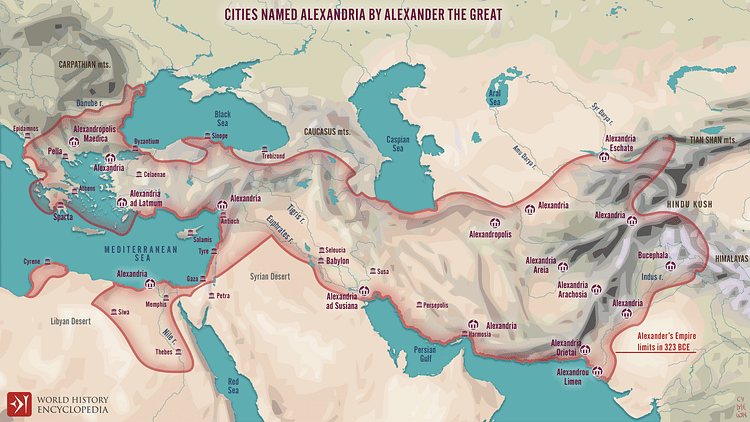
Loyalty to Alexander
Before marching into India and prior to their expedition into Bactria, there was major unrest within the army. The veterans were weary and wanted to return home to Macedonia and their families. Also, many staff officers disagreed with the king on many of his atypical decisions – his adoption of Persian customs and attire as well as his wish that they prostrate themselves before him and kiss his ring. They especially resented both the addition of Persians into the army and being asked to take Persian wives. However, unlike many others, Hephaestion always supported Alexander's decisions even with the idea of taking a Persian wife and he was given one of the daughters of Darius, Drypatis, while Alexander chose the other daughter, Barsine, as his mistress.
However, Hephaestion's loyalty to Alexander was best demonstrated during the would-be mutiny against Alexander. In 330 BCE Hephaestion, along with Craterus, spoke against Philotas, the suspected ringleader of the plot, convincing the king that he and the other conspirators should be tortured and executed - this execution also included Parmenio, Philotas' father and the long-time commander from the court of Philip. Afterwards, Alexander rewarded Hephaestion by splitting the command of the Companions between him and Cleitus.
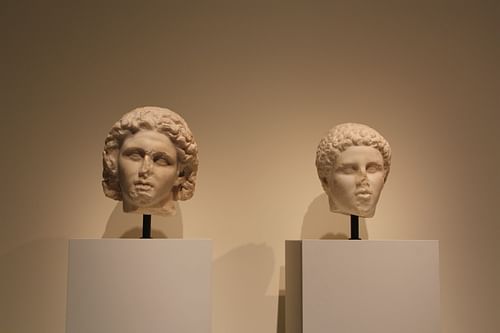
During the campaign in India, Hephaestion led a large force through the Khyber Pass subduing any rebellious Indian tribes. Next, Perdiccas and he took half the Companions, the mercenary cavalry, the baggage train and several Indian engineers to build a bridge across the Indus (this same bridge would be used to ford the Hydaspes). When lines of communication were secured, they rejoined Alexander and prepared to cross the Indus and face King Porus – at the Hydaspes Hephaestion would be placed in command of one squadron. After the victory against Porus, Hephaestion split with Alexander reconnecting later and battling against the Mallians – it was here that Alexander was injured and near death. Finally, he could go no farther; Alexander succumbed to the wishes of his troops and decided to return northward to Babylon.
Death
They spent the summer and fall at Ecbatana where, after a night of heavy drinking, Hephaestion developed a high fever – Alexander would remain by his friend's side until he showed signs of recovery. Unfortunately, Hephaestion soon relapsed, and in October of 324 BCE, he died (any possibility of poisoning has been dismissed). Alexander would die himself eight months later. The king spent the next two days in tears, grieving for the death of his friend. Besides cutting off his own hair, he ordered the manes and tails of all the horses cut off as well. A state of mourning was declared, sacrifices were made, and sacred fires were lit. Unfortunately, it was a sad day for Hephaestion's doctor, Glaucius, who was executed for his failure to keep his patient alive. Hephaestion's body would eventually be sent to Babylon where a giant pyre was built. Alexander sent an envoy to Siwa to request Hephaestion be declared a god, but the request was refused; he would only be honored as a divine hero. Plutarch wrote:
…he (Alexander) had the wretched doctor impaled on a stake and banned playing the pipes and all music in the camp for a considerable period of time, until he received an oracle from Ammon, telling him to worship Hephaestion as a hero and to institute sacrificial rituals in his honour.
Although some sources claim that Hephaestion and Alexander were more than just good friends, most agree that their relationship was unique and strengthened both men. Throughout his life, Hephaestion remained close to the king, serving both as a valuable advisor and friend. Whether or not he was a capable commander is irrelevant, his abilities in logistics assisted in the defeat of the Persians and their king Darius III.

